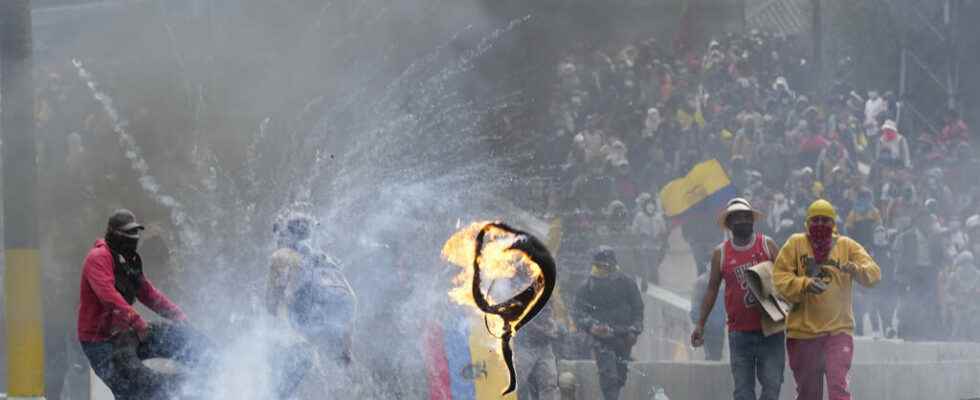” Demonstrations suffocate and put food at risk “, title Espresso. ” Endanger food “, because ” the prices of various products have increased, and some are not found in several provinces ” Explain the newspaper.
” suffocate “, because the security forces use tear gas: on the front page of the newspaper, soldiers separated from the demonstrators by gas smoke. Gas also used in the Central University of Ecuador, where hundreds of protesters have settled there since Monday, reports The Universe : men, women and children who were dancing to celebrate the Inca festival of Inti Raymi, denounced the Confederation of Indigenous Nationalities, Conaie. For their part, the police again asserted: act with strict respect for human rights after the death of a protester, reports Espresso. In all, two demonstrators lost their lives on Tuesday, the newspaper said.
But if the newspaper talks about demonstrations that ” choke is also, according to the newspaper, in the sense of do not advance “. According Espressothe leader of the Conaie Leonidas Iza ” postpones a solution to the national chaos by the voice of negotiation “. President Lasso, explains El Comercio“ agreed to mediation » put in place by « 300 civil society organizations “. But on his side, reports Espresso“ Leonidas Iza announced that he would not accept calls for dialogue “of organizations devoid of any legitimacy ” and served the government with a series of conditions “: reduction in repression, end of the state of emergency, and, specifies The Universethe demilitarization of a park and the Maison de la culture to hold a popular assembly.
Violence and legitimate claims
The press seems to have trouble understanding Conaie’s attitude: El Comercio speaks of a country to the point of death », and a capital (Quito) « subject to a political agenda “, with a Leonidas Iza who asks the demonstrators not to be violent when, according to the newspaper, in fact “ it’s a whole other story “. Same concern about the violence ofEl Mercuriowhich also states that the demands of the indigenous people are legitimate and that their demands are those of the vast majority of the population “.
However, ” they deprive people of their right to work to recover from the pandemic “, valued The Universe. ” The country will not support a forced departure of the president, the president must end his term, as planned, in 2025», hammers El Mercurio .
Assassinations in Mexico: death of three men, including two Jesuits
In Mexico, two Jesuits and a man were murdered: the man, pursued by killers, was seeking refuge in the church of an indigenous community in Chihuahua, says Excelsior. ” The Jesuits of Mexico will not be silent in the face of the violence that strikes the poorest of the country said Father Luis Moro, provincial leader of the Society of Jesus in Mexico, during the religious ceremony held yesterday, report Universal. The killings were condemned by various organizations, reports Jornadabut also the Senate, which demands that “ justice investigates and punishes the culprits “.Excelsior affirm that “ according to several testimonies, the group of killers was led by El Chueco, of the Gente Nueva criminal group, associated with the Sinaloa Cartel“.
El Chueco ” ravaged the region for years, causing the flight of hundreds of inhabitants “, writes the newspaper. Many murders are attributed to him. “Killing has become easy for some people in this country “, writes the editorialist of Universalwhich title on “ the ultimate sacrifice of the two Jesuits who helped the poor “: ” There are a lot of cowards, but people like Father Joaquin Mora and Father Javier Capos, there aren’t that many “.
In Colombia, Tymoshenko takes responsibility for more than 20,000 kidnappings
In Colombia, Rodrigo Londono Echevy, better known as Tymoshenko, the former leader of the Farc rebellion, took responsibility for 20,000 kidnappings. ” I hope that society and especially the victims can forgive us “, hoped the spokesperson for Farc, taken up by El Tiempowhile these crimes were going “ against the values and principles that were supposed to inspire our struggle “. This Tuesday, June 21, was the first day of public hearings, before the victims, Colombian society and the special jurisdiction for peace, ” key audience in the country’s reconciliation process, but also in the search for justice” highlighted El Tiempo.
For The Spectator“what was perhaps most important on Tuesday was that the victims of forcible confinement were able to speak “. Victims who, explainsEl Tiempo, say they are, on the whole, satisfied with what the six former Farc leaders said on Tuesday. But “they have to talk about all the cases, and tell the truth about each of them“, explained at the end of the hearing the lawyer Daniel Vargas, of the Colombian Commission of Jurists. Particularly in the case of those who have still not been found.
